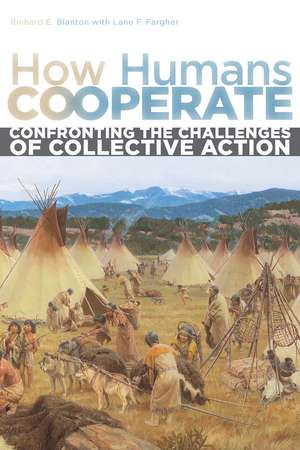How Humans Cooperate: Confronting the Challenges of Collective Action
Autor Richard E. Blanton Cu Lane F. Fargheren Limba Engleză Paperback – dec 2016 – vârsta ani
In How Humans Cooperate, Richard E. Blanton and Lane F. Fargher take a new approach to investigating human cooperation, developed from the vantage point of an "anthropological imagination." Drawing on the discipline’s broad and holistic understanding of humans in biological, social, and cultural dimensions and across a wide range of temporal and cultural variation, the authors unite psychological and institutional approaches by demonstrating the interplay of institution building and cognitive abilities of the human brain.
Blanton and Fargher develop an approach that is strongly empirical, historically deep, and more synthetic than other research designs, using findings from fields as diverse as neurobiology, primatology, ethnography, history, art history, and archaeology. While much current research on collective action pertains to local-scale cooperation, How Humans Cooperate puts existing theories to the test at larger scales in markets, states, and cities throughout the Old and New Worlds.
This innovative book extends collective action theory beyond Western history and into a broadly cross-cultural dimension, places cooperation in the context of large and complex human societies, and demonstrates the interplay of collective action and aspects of human cognitive ability. By extending the scope and content of collective action theory, the authors find a fruitful new path to understanding human cooperation.
Blanton and Fargher develop an approach that is strongly empirical, historically deep, and more synthetic than other research designs, using findings from fields as diverse as neurobiology, primatology, ethnography, history, art history, and archaeology. While much current research on collective action pertains to local-scale cooperation, How Humans Cooperate puts existing theories to the test at larger scales in markets, states, and cities throughout the Old and New Worlds.
This innovative book extends collective action theory beyond Western history and into a broadly cross-cultural dimension, places cooperation in the context of large and complex human societies, and demonstrates the interplay of collective action and aspects of human cognitive ability. By extending the scope and content of collective action theory, the authors find a fruitful new path to understanding human cooperation.
Preț: 297.83 lei
Nou
Puncte Express: 447
Preț estimativ în valută:
56.100€ • 59.17$ • 47.53£
56.100€ • 59.17$ • 47.53£
Carte tipărită la comandă
Livrare economică 25 martie-08 aprilie
Preluare comenzi: 021 569.72.76
Specificații
ISBN-13: 9781607326168
ISBN-10: 1607326167
Pagini: 436
Ilustrații: 40 black and white photographs, line drawings, maps, and tables
Dimensiuni: 152 x 229 x 28 mm
Greutate: 0.59 kg
Ediția:1
Editura: University Press of Colorado
Colecția University Press of Colorado
ISBN-10: 1607326167
Pagini: 436
Ilustrații: 40 black and white photographs, line drawings, maps, and tables
Dimensiuni: 152 x 229 x 28 mm
Greutate: 0.59 kg
Ediția:1
Editura: University Press of Colorado
Colecția University Press of Colorado
Recenzii
"This is a brilliant work that offers a raft of insights and new ideas drawn from more than a dozen academic disciplines. . . . Clearly, this is a topic of great twenty-first-century significance."
—Gary Feinman, The Field Museum
"How Humans Cooperate is 'big' anthropology, the likes of which we do not see every day. . . . Blanton and Fargher have done us a service by bringing this literature [of extra-anthropological disciplines] to our attention, and it will be interesting to see if other anthropologists pick up this line of investigation and what insights it yields."
—Anthropology Review Database
"[A] provocative book addressed not so much to archaeologists but to those who would choose to ignore wide swathes of our history in constructing models of how we interact with each other in larger groups. With Fargher, Blanton demonstrates that well-functioning institutions are foundational to maintaining collective benefits in both modern and pre-modern states."
—Antiquity
—Gary Feinman, The Field Museum
"How Humans Cooperate is 'big' anthropology, the likes of which we do not see every day. . . . Blanton and Fargher have done us a service by bringing this literature [of extra-anthropological disciplines] to our attention, and it will be interesting to see if other anthropologists pick up this line of investigation and what insights it yields."
—Anthropology Review Database
"[A] provocative book addressed not so much to archaeologists but to those who would choose to ignore wide swathes of our history in constructing models of how we interact with each other in larger groups. With Fargher, Blanton demonstrates that well-functioning institutions are foundational to maintaining collective benefits in both modern and pre-modern states."
—Antiquity
“A wide-ranging examination of how various factors, including intentionally and spontaneously developed institutions and behaviors, have promoted collective action. . . . the book will encourage dialogue between the presently uncooperative camps of ‘collective action theorists’ and ‘evolutionary psychologists’.”
—The Quarterly Review of Biology
—The Quarterly Review of Biology
Notă biografică
Richard E. Blanton is professor of anthropology at Purdue University. A recognized authority on the pre-Hispanic cultures of Mesoamerica, he is past president of the Society for Economic Anthropology and a Fellow of the American Association for the Advancement of Science and has made significant contributions to the theoretical and comparative study of early states, cities, and economies.
Lane F. Fargher is investigator in the Department of Human Ecology, Centro de Investigación y de Estudios Avanzados del IPN—Unidad Mérida, Yucatán, México and codirector of the Tlaxcallan Archaeological Project (in Tlaxcala, Mexico). A Mesoamerican archaeologist and cross-cultural researcher, he is interested in the role of cooperation and collective action in markets, ancient cities, landscapes, and households.
Lane F. Fargher is investigator in the Department of Human Ecology, Centro de Investigación y de Estudios Avanzados del IPN—Unidad Mérida, Yucatán, México and codirector of the Tlaxcallan Archaeological Project (in Tlaxcala, Mexico). A Mesoamerican archaeologist and cross-cultural researcher, he is interested in the role of cooperation and collective action in markets, ancient cities, landscapes, and households.
Descriere
Blanton and Fargher develop is strongly empirical, historically deep, and more synthetic approach to investigating human cooperation, using findings from fields as diverse as neurobiology, primatology, ethnography, history, art history, and archaeology.










